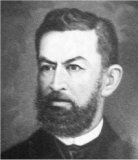
Juan León Mera
Encyclopedia

Ecuador
Ecuador , officially the Republic of Ecuador is a representative democratic republic in South America, bordered by Colombia on the north, Peru on the east and south, and by the Pacific Ocean to the west. It is one of only two countries in South America, along with Chile, that do not have a border...
ian poet
Poet
A poet is a person who writes poetry. A poet's work can be literal, meaning that his work is derived from a specific event, or metaphorical, meaning that his work can take on many meanings and forms. Poets have existed since antiquity, in nearly all languages, and have produced works that vary...
, novelist, journalist
Journalist
A journalist collects and distributes news and other information. A journalist's work is referred to as journalism.A reporter is a type of journalist who researchs, writes, and reports on information to be presented in mass media, including print media , electronic media , and digital media A...
, critic
Critic
A critic is anyone who expresses a value judgement. Informally, criticism is a common aspect of all human expression and need not necessarily imply skilled or accurate expressions of judgement. Critical judgements, good or bad, may be positive , negative , or balanced...
, politician
Politician
A politician, political leader, or political figure is an individual who is involved in influencing public policy and decision making...
and satirist.
Mera is known as the father of Ecuadorian literature, principally for being the author of Cumandá (1879). This is a novel about the clandestine love affair between a young woman from an Amazonian
Amazon Basin
The Amazon Basin is the part of South America drained by the Amazon River and its tributaries that drains an area of about , or roughly 40 percent of South America. The basin is located in the countries of Bolivia, Brazil, Colombia, Ecuador, Guyana, Peru, and Venezuela...
tribe, and the son of a Spanish
Spanish people
The Spanish are citizens of the Kingdom of Spain. Within Spain, there are also a number of vigorous nationalisms and regionalisms, reflecting the country's complex history....
Dominican
Dominican Order
The Order of Preachers , after the 15th century more commonly known as the Dominican Order or Dominicans, is a Catholic religious order founded by Saint Dominic and approved by Pope Honorius III on 22 December 1216 in France...
friar. Their relationship is doubly doomed: not only because it is opposed by the girl's father, but also because it is ultimately revealed that the pair are in fact brother and sister. Yet the moral of the story is that people can change: the indigenous father, who turns out to have kidnapped the girl as a child as he also killed her lover's mother, is converted to Christianity in what are (literally) his dying breaths. Mera therefore (ostensibly) argues for the peaceful assimilation of indigenous people within the national project, by means of the twin virtues of religion and love. The novel is widely taught in Ecuadoran primary and secondary schools and is considered to be among the most important achievements of nineteenth-century Latin American literature
Latin American literature
Latin American literature consists of the oral and written literature of Latin America in several languages, particularly in Spanish, Portuguese, and indigenous languages of the Americas. It rose to particular prominence globally during the second half of the 20th century, largely due to the...
.
Mera also wrote the words to the Ecuadoran national anthem.

